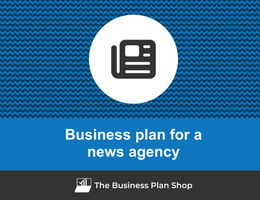How to create a financial forecast for a news agency?
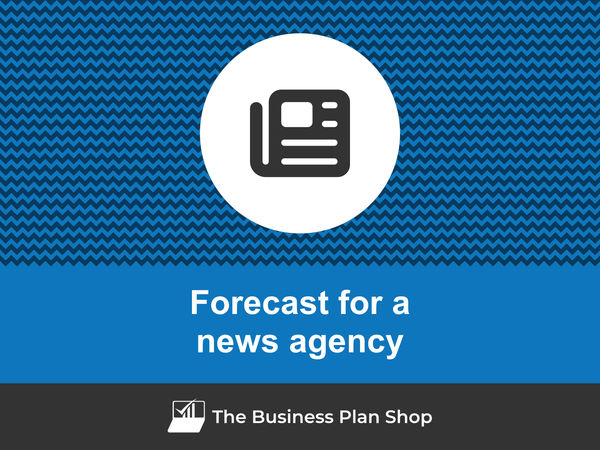
Creating a financial forecast for your news agency, and ensuring it stays up to date, is the only way to maintain visibility on future cash flows.
This might sound complex, but with the right guidance and tools, creating an accurate financial forecast for your news agency is not that hard.
In this guide, we'll cover everything from the main goal of a financial projection, the data you need as input, to the tables that compose it, and the tools that can help you build a forecast efficiently.
Without further ado, let us begin!
Why create and maintain a financial forecast for a news agency?
In order to prosper, your business needs to have visibility on what lies ahead and the right financial resources to grow. This is where having a financial forecast for your news agency becomes handy.
Creating a news agency financial forecast forces you to take stock of where your business stands and where you want it to go.
Once you have clarity on the destination, you will need to draw up a plan to get there and assess what it means in terms of future profitability and cash flows for your news agency.
Having this clear plan in place will give you the confidence needed to move forward with your business’s development.
Having an up-to-date financial forecast for a news agency is also useful if your trading environment worsens, as the forecast enables you to adjust to your new market conditions and anticipate any potential cash shortfall.
Finally, your news agency's financial projections will also help you secure financing, as banks and investors alike will want to see accurate projections before agreeing to finance your business.
Need a convincing business plan?
The Business Plan Shop makes it easy to create a financial forecast to assess the potential profitability of your projects, and write a business plan that’ll wow investors.

What information is used as input to build a news agency financial forecast?
A news agency's financial forecast needs to be built on the right foundation: your assumptions.
The data required to create your assumptions will depend on whether you are a new or existing news agency.
If you are creating (or updating) the forecast of an existing news agency, then your main inputs will be historical accounting data and operating metrics, and your team’s view on what to expect for the next three to five years.
If you are building financial projections for a new news agency startup, you will need to rely on market research to form your go-to-market strategy and derive your sales forecast.
For a new venture, you will also need an itemised list of resources needed for the news agency to operate, along with a list of equipment required to launch the venture (more on that below).
Now that you understand what is needed, let’s have a look at what elements will make up your news agency's financial forecast.
The sales forecast for a news agency
The sales forecast, also called topline projection, is normally where you will start when building your news agency financial forecast.
Creating a coherent sales projection boils down to estimating two key drivers:
- The average price
- The number of monthly transactions
To do this, you will need to rely on historical data (for an existing business), market research data (for both new and existing news agencies), and consider the elements below:
- Competition: The level of competition in the news agency industry can greatly impact your average price and number of monthly transactions. If there are a lot of other news agencies in your area, you may have to lower your prices to remain competitive, which could affect your average price. Additionally, if your competitors are offering better deals or promotions, it could lead to a decrease in your number of monthly transactions.
- Economic climate: The state of the economy can also have a significant impact on your average price and monthly transactions. During times of economic downturn, people may be less likely to spend money on news and may be more price-conscious. This could lead to a decrease in your average price and number of transactions. On the other hand, during a strong economy, people may be willing to pay more for quality news, which could increase your average price and number of transactions.
- News events: The occurrence of major news events can also affect your business's average price and number of transactions. For example, if there is a major political or economic event happening, people may be more interested in staying updated on the news, which could lead to an increase in your number of transactions. However, if the event is negative or controversial, it could also potentially lead to a decrease in your average price as people may be less willing to pay for news that they can access for free elsewhere.
- Technology: Advances in technology can impact your business's average price and number of transactions in various ways. For instance, the increasing popularity of digital news sources and social media may lead to a decrease in your average price as people may be more inclined to access news for free online. On the other hand, technology can also provide opportunities for new revenue streams, such as offering premium digital subscriptions or creating interactive content, which could increase your average price and number of transactions.
- Demographics: The demographic makeup of your target audience can also play a role in your business's average price and number of transactions. For example, if your news agency primarily caters to an older audience, they may be more likely to pay for traditional print newspapers, which could lead to a higher average price. However, if your target audience is younger and more tech-savvy, they may prefer digital news sources and be less willing to pay, which could result in a lower average price and number of transactions.
After the sales forecast comes the operating expenses budget, which we will now look into in more detail.
Need a convincing business plan?
The Business Plan Shop makes it easy to create a financial forecast to assess the potential profitability of your projects, and write a business plan that’ll wow investors.

The operating expenses for a news agency
The next step is to estimate the expenses needed to run your news agency on a day-to-day basis.
These will vary based on the level of sales expected, and the location and size of your business.
But your news agency's operating expenses should include the following items at a minimum:
- Staff costs: This includes salaries, benefits, and any other costs associated with hiring and retaining employees for your news agency.
- Accountancy fees: You will need to hire an accountant to keep track of your financial records and ensure compliance with tax laws.
- Insurance costs: As a news agency, you will need to protect your business and employees with liability insurance, property insurance, and workers' compensation insurance.
- Software licenses: To stay up-to-date with the latest news and technology, you may need to purchase software licenses for news editing, publishing, and media management.
- Banking fees: You will need to open a business bank account and may incur fees for transactions, wire transfers, and other banking services.
- Rent/Lease: If you are operating out of a physical office, you will have to pay rent or lease payments for the space.
- Utilities: This includes costs for electricity, water, internet, and phone services for your office.
- Marketing and advertising: To promote your news agency and attract readers, you may need to spend money on marketing and advertising campaigns.
- Travel expenses: If your news agency covers stories outside of your local area, you may need to budget for travel expenses such as airfare, lodging, and transportation.
- Office supplies: This includes items like pens, paper, printer ink, and other materials necessary for day-to-day operations.
- Professional development: To stay current in the constantly changing world of news, you may need to budget for professional development courses or conferences.
- Telecommunications: This includes costs for phone and internet services for your office.
- Web hosting and domain fees: If your news agency has a website, you will need to pay for web hosting and domain registration fees.
- Office equipment: This includes costs for computers, printers, cameras, and other equipment necessary for your news agency.
- Legal fees: You may need to consult with lawyers for advice on copyright, libel, or other legal matters related to your news agency.
This list is, of course, not exhaustive, and you'll have to adapt it according to your precise business model and size. A small news agency might not have the same level of expenditure as a larger one, for example.
What investments are needed to start or grow a news agency?
Once you have an idea of how much sales you could achieve and what it will cost to run your news agency, it is time to look into the equipment required to launch or expand the activity.
For a news agency, capital expenditures and initial working capital items could include:
- Newsroom Equipment: This includes cameras, microphones, lighting equipment, and other essential tools for capturing and reporting news stories. Upgrading or replacing this equipment is necessary to ensure high-quality news coverage.
- Broadcasting Equipment: News agencies often have their own broadcasting facilities for live reporting or producing news programs. This includes items such as transmitters, satellite dishes, and audio mixing equipment.
- Office Furniture and Technology: As a news agency, you need to have a well-equipped office space for your employees to work efficiently. This may include desks, chairs, computers, printers, and other necessary technologies.
- Vehicles: Depending on the size and scope of your news agency, you may need to invest in vehicles for on-the-ground reporting and transportation of equipment. This could include cars, vans, or even helicopters.
- Studio and Set Design: For news agencies that have their own studio for producing news programs, investing in high-quality studio and set design is essential. This includes items such as lighting, cameras, and props.
Again, this list will need to be adjusted according to the specificities of your news agency.
Need a convincing business plan?
The Business Plan Shop makes it easy to create a financial forecast to assess the potential profitability of your projects, and write a business plan that’ll wow investors.

The financing plan of your news agency
The next step in the creation of your financial forecast for your news agency is to think about how you might finance your business.
You will have to assess how much capital will come from shareholders (equity) and how much can be secured through banks.
Bank loans will have to be modelled so that you can separate the interest expenses from the repayments of principal, and include all this data in your forecast.
Issuing share capital and obtaining a bank loan are two of the most common ways that entrepreneurs finance their businesses.
What tables compose the financial plan for a news agency?
Now let's have a look at the main output tables of your news agency's financial forecast.
The profit & loss forecast
The forecasted profit & loss statement will enable you to visualise your news agency's expected growth and profitability over the next three to five years.
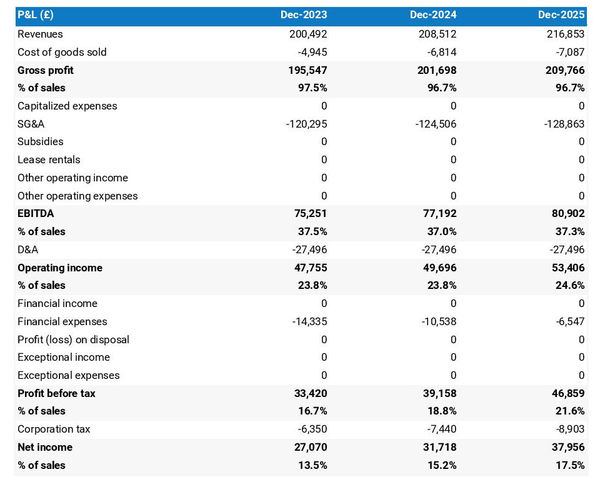
A financially viable P&L statement for a news agency should normally show:
- Sales growing above inflation
- Stable or expanding (ideally) profit margins
- A net profit
This will of course depend on the stage of your business: a new venture might be loss-making until it reaches its breakeven point in year 2 or 3, for example.
The projected balance sheet
Your news agency's projected balance sheet provides a snapshot of your business’s financial position at year-end.
It is composed of three types of elements: assets, liabilities and equity:
- Assets: represent what the business possesses including cash, equipment, and accounts receivable (money owed by clients).
- Liabilities: represent funds advanced to the business by lenders and other creditors. They include accounts payable (money owed to suppliers), taxes payable and loans from banks and financial institutions.
- Equity: is the combination of what has been invested by the business owners and the cumulative profits and losses generated by the business to date (which are called retained earnings). Equity is a proxy for the value of the owner's stake in the business.
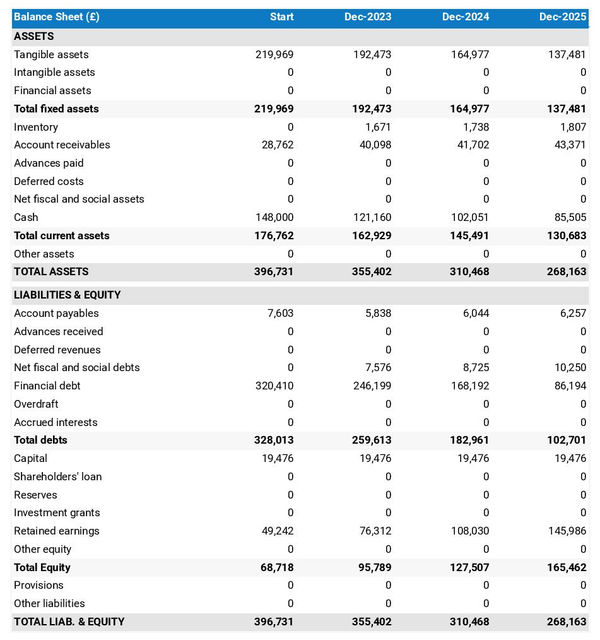
The projected cash flow statement
A projected cash flow statement for a news agency is used to show how much cash the business is generating or consuming.
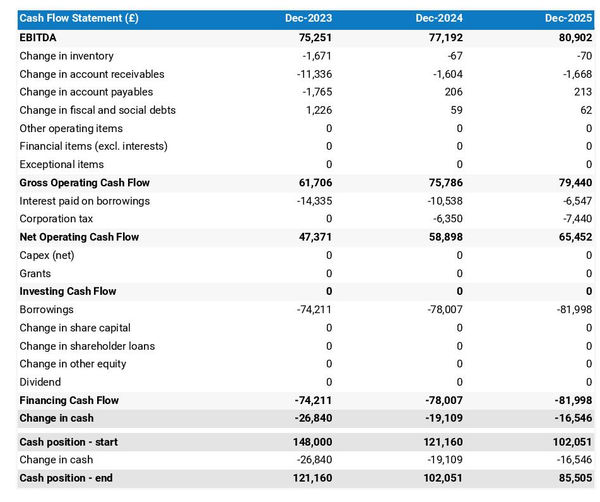
The cash flow forecast is usually organised by nature to show three key metrics:
- The operating cash flow: do the core business activities generate or consume cash?
- The investing cash flow: how much is the business investing in long-term assets (this is usually compared to the level of fixed assets on the balance sheet to assess whether the business is regularly maintaining and renewing its equipment)?
- The financing cash flow: is the business raising new financing or repaying financiers (debt repayment, dividends)?
Cash is king and keeping an eye on future cash flows is imperative for running a successful business. Therefore, you should pay close attention to your news agency's cash flow forecast.
If you are trying to secure financing, note that it is customary to provide both yearly and monthly cash flow forecasts in a financial plan - so that the reader can analyze seasonal variation and ensure the news agency is appropriately capitalised.
Need a convincing business plan?
The Business Plan Shop makes it easy to create a financial forecast to assess the potential profitability of your projects, and write a business plan that’ll wow investors.

Which tool should you use to create your news agency's financial forecast?
Creating your news agency's financial forecast may sound fairly daunting, but the good news is that there are several ways to go about it.
Using online financial forecasting software to build your news agency's projections
The modern and easiest way is to use professional online financial forecasting software such as the one we offer at The Business Plan Shop.
There are several advantages to using specialised software:
- You can easily create your financial forecast by letting the software take care of the financial calculations for you without errors
- You have access to complete financial forecast templates
- You get a complete financial forecast ready to be sent to your bank or investors
- You can easily track your actual financial performance against your financial forecast, and recalibrate your forecast as the year goes by
- You can create scenarios to stress test your forecast's main assumptions
- You can easily update your forecast as time goes by to maintain visibility on future cash flows
- You have a friendly support team on standby to assist you when you are stuck
- It’s cost-efficient and much cheaper than using an accountant or consultant (see below)
If you are interested in this type of solution, you can try our forecasting software for free by signing up here.
Hiring a financial consultant or chartered accountant
Hiring a consultant or chartered accountant is also an efficient way to get a professional news agency financial projection.
As you can imagine, this solution is much more expensive than using software. From experience, the creation of a simple financial forecast over three years (including a balance sheet, income statement, and cash flow statement) is likely to start around £700 or $1,000 excluding taxes.
The indicative estimate above, is for a small business, and a forecast done as a one-off. Using a financial consultant or accountant to track your actuals vs. forecast and to keep your financial forecast up to date on a monthly or quarterly basis will naturally cost a lot more.
If you choose this solution, make sure your service provider has first-hand experience in your industry, so that they may challenge your assumptions and offer insights (as opposed to just taking your figures at face value to create the forecast’s financial statements).
Why not use a spreadsheet such as Excel or Google Sheets to build your news agency's financial forecast?
You and your financial partners need numbers you can trust. Unless you have studied finance or accounting, creating a trustworthy and error-free news agency financial forecast on a spreadsheet is likely to prove challenging.
Financial modelling is very technical by nature and requires a solid grasp of accounting principles to be done without errors. This means that using spreadsheet software like Excel or Google Sheets to create accurate financial forecasts is out of reach for most business owners.
Creating forecasts in Excel is also inefficient nowadays:
- Software has advanced to the point where forecasting can be done much faster and more accurately than manually on a spreadsheet.
- With artificial intelligence, the software is capable of detecting mistakes and helping decision-making.
Spreadsheets are versatile tools but they are not tailor-made for reporting. Importing your news agency's accounting data in Excel to track actual vs. forecast is incredibly manual and tedious (and so is keeping forecasts up to date). It is much faster to use dedicated financial planning tools like The Business Plan Shop which are built specially for this.
Need a convincing business plan?
The Business Plan Shop makes it easy to create a financial forecast to assess the potential profitability of your projects, and write a business plan that’ll wow investors.

Use our financial projection templates for inspiration
The Business Plan Shop has dozens of financial forecasting templates available.
Our examples contain both the financial forecast, and a written business plan which presents, in detail, the company, the team, the strategy, and the medium-term objectives.
Whether you are just starting out or already have your own news agency, looking at our template is always a good way to get ideas on how to model financial items and what to write when creating a business plan to secure funding.
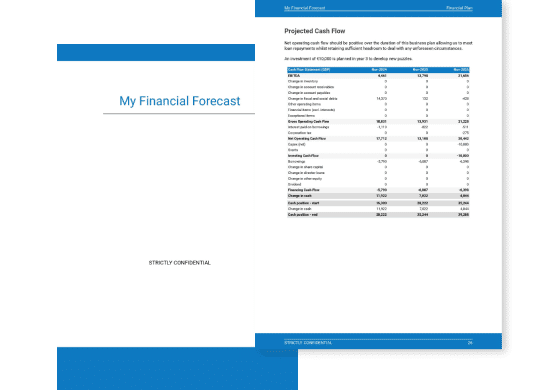
Takeaways
- A financial forecast shows expected growth, profitability, and cash generation metrics for your news agency.
- Tracking actuals vs. forecast and having an up-to-date financial forecast is key to maintaining visibility on your future cash flows.
- Using financial forecasting software is the modern way of creating and maintaining financial projections.
We hope that this guide helped you gain a clearer perspective on the steps needed to create the financial forecast for a news agency. Don't hesitate to contact us if you have any questions!
Need a convincing business plan?
The Business Plan Shop makes it easy to create a financial forecast to assess the potential profitability of your projects, and write a business plan that’ll wow investors.

Also on The Business Plan Shop
- Financial forecast example
- How to project revenues for a business?
- Sample financial forecast for business idea
Know someone who runs a news agency? Share our business guide with them!


